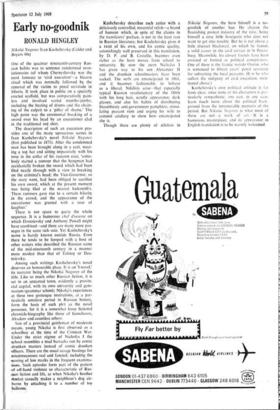Early no-goodnik
RONALD HINGLEY
One of the quainter nineteenth-century Rus- sian habits was to sentence condemned revo- lutionaries (of whom Chernyshevsky was the most famous) to 'civil execution'—a bizarre ritual which was normally followed by the removal of the victim to penal servitude in Siberia. It took place in public on a specially erected scaffold, but was comparatively pain- less and involved varied mumbo-jumbo, including the beating of drums and the chain- ing of the culprit to a 'pillar of shame.' The high point was the ceremonial breaking of a sword over his head by an executioner clad in the traditional red shirt.
The description of- such an execution pro- vides one of the many uproarious scenes in Ivan Kushchevsky's novel Nikolai Negorev (first published in 1871). After the condemned man has been brought along in a cart, wear- ing a top hat and sitting impassively with his nose in the collar of his raccoon coat, 'some- body started a rumour that the hangman had accidentally broken the sword which had been filed nearly through with a view to breaking on the criminal's head; the Vice-Governor, so the story went, had been obliged to sacrifice his own sword, which at the present moment was being filed at the nearest locksmith's. These rumours gave rise to a certain hilarity in the crowd, and the appearance of the executioner was greeted with a roar of laughter.'
There is not space to quote the whole sequence. It is a humorous chef d'oeuvre on which Dostoievsky and Anthony Powell might have combined—and there are many more pas- sages in the same rich vein. Yet Kushchevsky's name is barely known outside Russia. Even there he tends to be lumped with a host of other writers who described the Russian scene of the mid-nineteenth century in a manner more modest than that of Tolstoy or Dos- toievsky.
Among such writings Kushchevsky's novel deserves an honourable place. It is an `I-novel,' its narrator being the Nikolai Negorev of the title. Like so much other Russian fiction, it is set in an unnamed town, evidently a provin- cial capital, with its own university and gym- nasium (grammar schobl). Nikolai's experiences at these two grotesque institutions, at a par- ticularly sensitive period in Russian history, form the basis of such plct as the novel possesses, for it is a somewhat loose fictional chronicle-biography like those of Goncharov, Aksakov and countless others.
Son of a provincial gentleman of moderate means, young Nikolai is first observed as a schoolboy at the time of the Crimean War. Under the strict regime of Nicholas I the school resembles a mad barracks run by comic drunken masters instead of comic drunken -officers. There are the usual savage beatings for misdemeanours real and fancied, including the -scoring of low marks in the frequent examina- lions. Such episodes form part of the pattern iff -off-hand violence so characteristic of Rus- sian fiction and life, as when Nikolai's brother skndrei casually makes a neighbour's dog air- borne by attaching it 'to a number of toy balloons.
Kushchevsky describes such antics with a deliciously controlled, mournful relish—a brand of humour which, in spite of the claims in the translators' preface, is not in the least rare in Russian literature; but Kushchevsky gives it a twist of his own, and his comic quality, astonishingly well preserved in this translation, by D. P. and B. Costello, becomes even richer as the hero moves from school to university. By now the stern Nicholas I has given way to his son Alexander II and the drunken schoolmasters have been sacked. The serfs are emancipated in 1861, and it becomes fashionable to behave as a liberal. Nihilists arise—that especially typical Russian revolutionary of the 1860s with his long hair, scruffy appearance, dark glasses, and also his habits of distributing bloodthirsty anti-government pamphlets, stimu- lating peasant riots and urging his wife to commit adultery to show how emancipated she is.
Though there are plenty of nihilists in
Nikolai Negorev, the hero himself is a no- goodnik of another hue. He abjures the flourishing protest industry of the time, being himself a cosy little bourgeois who does not want to get into trouble. But he is not above a little discreet blackmail, on which he founds a solid career in the civil service in St Peters- burg. Meanwhile, his closest friends have been arrested or hunted as political conspirators. One of these is the frantic weirdo Overin. who is sentenced to fifteen years' penal servitude for subverting the local peasants. (It is he who suffers the indignity of civil execution, men- tioned above.)
Kushchevsky's own political attitude is far from clear, since none of his characters is par- ticularly sympathetic; one can, in any case. learn much more about the political back- ground from the innumerable memoirs of the period. But Nikolai Negorev is what most of these are not—a work of art.—It is a humorous masterpiece, and its appearance in English translation is to be warmly welcomed.






































 Previous page
Previous page